|
|
|
Sort Order |
|
|
|
Items / Page
|
|
|
|
|
|
|
| Srl | Item |
| 1 |
ID:
110828
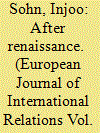

|
|
|
|
|
| Publication |
2012.
|
| Summary/Abstract |
Why does a re-emerging China pursue institutional strategies to expand its multilateral ties all over the world? This study explains the genesis of China's new multilateral diplomacy toward Africa, Latin America, and the Middle East. The central argument of the study is that many strands of structural arguments drawn from realist, liberal, and constructivist insights cannot provide complete explanations about China's multilateral activism without recourse to cognitive feedback dynamics. China fed its regional experiences of multilateralism back into its global policy formation. This experiment-based approach has been a pervasive feature in Chinese multilateral diplomacy as well as Chinese domestic reforms during the post-Mao period. The cognitive feedback model developed in this study intends to complement the prominent structural explanations by identifying micro-level dynamics and seeks to contribute to today's debate over power transition and international order.
|
|
|
|
|
|
|
|
|
|
|
|
|
|
|
|
| 2 |
ID:
110831
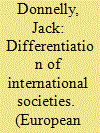

|
|
|
|
|
| Publication |
2012.
|
| Summary/Abstract |
Taking off from a recent article in this journal by Barry Buzan and Mathias Albert, I present a framework of structural differentiation as an alternative to IR's standard tripartite conception of the elements of structure. Rather than employ ideal type models, though, as Buzan and Albert do, I present a more open-textured, multidimensional account of differentiation. I also emphasize the systemic nature of structural analysis. The elements of structure are interdependent parts of wholes (systems) - not the independent variables implied by standard formulations such as 'the effects of anarchy'. A multidimensional systemic approach directs our attention to the diversity of and change in international systems and their structures, which mainstream structural IR typically ignores or obscures. I illustrate both the regularity of extensive structural change and the analytical utility of my differentiation framework with case studies of post-World War II international society and contemporary processes of globalization.
|
|
|
|
|
|
|
|
|
|
|
|
|
|
|
|
| 3 |
ID:
110826
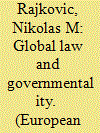

|
|
|
|
|
| Publication |
2012.
|
| Summary/Abstract |
This article challenges the optimism common to liberal IR and IL scholarship on the 'rule of law' in global governance. It argues that the concept of the 'rule of law' is often employed with sparse inquiry into the politics of its practical meaning. Specifically, the article focuses on liberal research that advocates the emergence of a 'global' judiciary, and the claim that judicial governance will marginalize state power and authority. Rather than employ a zero-sum conception of power, this article regards a prospective global legal system less as a constraint on state power and more as a rationale for rule 'through' law by vested actors. To make the argument, Michel Foucault's concept of 'governmentality' is combined with Barnett and Duvall's notion of 'productive power' to denote how legal techniques of power are integral to the construction of social 'truth' and consequently the governance of conduct. This is further associated with Koskenniemi's critical scholarship on the power of law's perceived objectivity and universality. In this vein, the article questions how liberal scholars use the American judicial model (the Marbury ideal) to claim that an institutionalization of 'global' judicial authority can deliver the rule of 'no one' in global governance. A governmentality perspective is then applied which suggests that the lack of supreme constitutional rules at the global level makes judicial governance less a check than a means to propagate normative standards conducive to dominant state power.
|
|
|
|
|
|
|
|
|
|
|
|
|
|
|
|
| 4 |
ID:
110829


|
|
|
|
|
| Publication |
2012.
|
| Summary/Abstract |
The diffusion of international norms and their effects on policy and political behaviour are central research questions in international relations. Informed by constructivism, prevailing models are marked by a crucial tension between a static view of norm content and a dynamic picture of norm adoption and implementation. Observing that norms continue to evolve after they emerge, we argue that a discursive approach offers a more promising way forward for theorizing and analysing the life cycles of international norms. We present a view of norms as processes, calling attention to both 'internal' and 'external' sources of dynamism. We illustrate this theory by tracing and comparing the life cycles of two global equality norms: gender-balanced decision-making and gender mainstreaming. We find that these norms emerged from two distinct policy realms, and after briefly converging in the mid-1990s, have since developed largely separately from, and often in tension with, one another.
|
|
|
|
|
|
|
|
|
|
|
|
|
|
|
|
| 5 |
ID:
110825


|
|
|
|
|
| Publication |
2012.
|
| Summary/Abstract |
Conventional accounts of international society's expansion have traditionally emphasized the role played by 'civilizing missions' in facilitating and legitimating European aggression and imperial expansion. Conversely, in this article, I demonstrate that the relationship between imperial violence and the rhetoric of 'civilizing missions' was far more contested and contingent than International Relations scholars have generally assumed. Using the parliamentary debate surrounding Britain's involvement in the Second Opium War as a case study, I reveal that civilizational rhetoric in the 1857 'China debate' was equally implicated in both anti-imperialist and imperialist agendas. Richard Cobden's victory in the debate over Palmerston's pro-war ministry further illustrates the political potency of appeals to civilization as a brake - however temporary - on Britain's imperial expansion. An appreciation of civilization's janus-faced character - as a rhetorical commonplace that at different times abetted and inhibited imperial aggression - is therefore critical if we are to comprehend the halting and arrhythmic pattern of international society's progressive expansion under British leadership in the mid-Victorian period.
|
|
|
|
|
|
|
|
|
|
|
|
|
|
|
|
| 6 |
ID:
110832
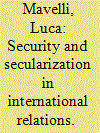

|
|
|
|
|
| Publication |
2012.
|
| Summary/Abstract |
What is the relationship between security and secularization in International Relations? The widespread acceptance of secularism as the paradigmatic framework that underlies the study of world politics has left this question largely unexplored. Yet, the recent challenges to the secularization thesis and the growing attention that is being devoted to questions of religion and secularism in international politics increasingly suggest the importance of undertaking this investigation. This article takes up this task in three main steps. First, it will explore how the limits of a widely accepted but nonetheless problematic account of the emergence of the modern Westphalian nation-state contribute to a dominant underlying assumption in security studies that implicitly associates security with secularization. Second, it will articulate a competing genealogy of security and secularization which suggests that rather than solving the problem of religious insecurity, secularization makes the question of fear and the politics of exceptionalism central to the state-centric project of modernity and its related vision of security. Finally, the article will examine how these elements inform and, most of all, constrain attempts to move beyond the traditional state-centric framework of security. The focus will be on three such attempts: human security, the securitization theory and Ken Booth's critical theory of security.
|
|
|
|
|
|
|
|
|
|
|
|
|
|
|
|
| 7 |
ID:
110827
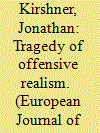

|
|
|
|
|
| Publication |
2012.
|
| Summary/Abstract |
What is the realist position on how to deal with the rise of China? One prominent realist approach, associated with John Mearsheimer, calls for the US to do whatever it can to slow China's rise. However, while this is a realist perspective, it is not the realist perspective. In particular, realist approaches that derive from a classical foundation suggest policies fundamentally different from those favored by Mearsheimer. This article argues that realism should return to some of its classical traditions. It reviews why, from a classical realist perspective, the rise of China must be viewed with alarm, but argues that Mearsheimer's approach - offensive realism - is wrong, and dangerous. Many of these errors are rooted in structuralism; a classical realist approach, which allows for the influence of history and politics, provides greater analytical purchase and wiser policy prescriptions than offensive realism.
|
|
|
|
|
|
|
|
|
|
|
|
|
|
|
|
| 8 |
ID:
110830
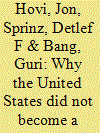

|
|
|
|
|
| Publication |
2012.
|
| Summary/Abstract |
According to two-level game theory, negotiators tailor agreements at the international level to be ratifiable at the domestic level. This did not happen in the Kyoto negotiations, however, in the US case. We interviewed 26 German, Norwegian, and US participants in and observers of the climate negotiations concerning their views on three explanations for why the United States did not become a party to Kyoto. Explanation 1 argues that Kyoto delegations mistakenly thought the Senate was bluffing when adopting Byrd-Hagel. Explanation 2 contends that Europeans preferred a more ambitious agreement without US participation to a less ambitious agreement with US participation. Finally, explanation 3 suggests that in Kyoto the Clinton-Gore administration gave up on Senate ratification, and essentially pushed for an agreement that would provide them a climate-friendly face. While all explanations received some support from interviewees, explanation 1 and (particularly) explanation 3 received considerably more support than explanation 2.
|
|
|
|
|
|
|
|
|
|
|
|
|
|
|
|
|
|
|
|
|